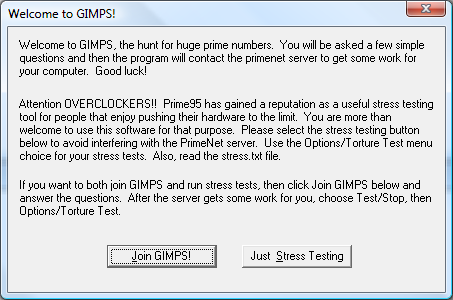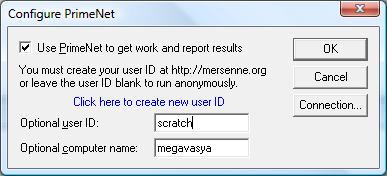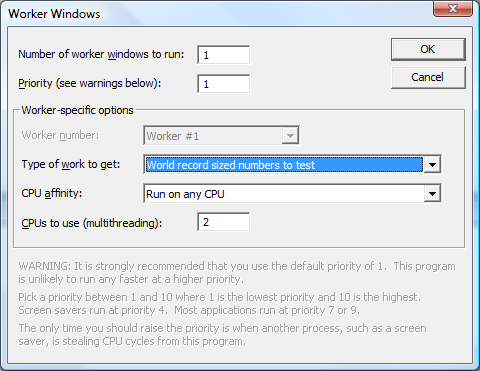Now habrovchan has a team in the project GIMPS!

Greetings
Probably, many have already heard about the project of distributed computing to search for large prime numbers GIMPS (Great Internet Mersenne Prime Search). On Habré already skipped information about the project and its results.
If you are one of those who like to look at 12 megabyte numbers in search of interesting things and just for the purpose of meditation, you are not afraid to see the 100 percent CPU load all the time (knowing that the program works with a “lower than average” priority and has almost no effect on the speed of the machine) just want to contribute to the development of mathematics, then I ask for cat.
First of all, we download a small archive from here for our system and unpack it in a secluded place. In particular, here are the links for win32 and win x64 .
')
Run, click “Join Gimps!”

Further, if you are too lazy to register, you can enter my id scratch and your nickname (statistics are maintained for each machine separately, but I didn’t find how to look at unregistered users, and I don’t need it), or register by clicking on " Click here to create new user ID "and enter your data.

After registration, if you wish, you can join the habrahabr.ru team by finding it here or following this link.
Now the memory settings for tests on the algorithms P-1 / ECM.

These tests are performed relatively shortly (about a day), but their speed directly depends on how much memory you allocate to them. I allocated 1 gigabyte out of four on my car, less is possible.
And finally, the calculation settings:

By default, the program offers to simultaneously check as many numbers as you have kernels, but I chose to check one number in several threads (faster result). To do this, in “Number of worker windows to run” set one and then click somewhere, then “CPUs to use” is unlocked - the number of involved cores is set here, you can use not all, but only 3 of 4, for example.
Everything , click ok and enjoy joining the search for the next giant prime!
PS placed in "Algorithms", in the absence of blogs "mathematics" and "distributed computing."
Source: https://habr.com/ru/post/114490/
All Articles